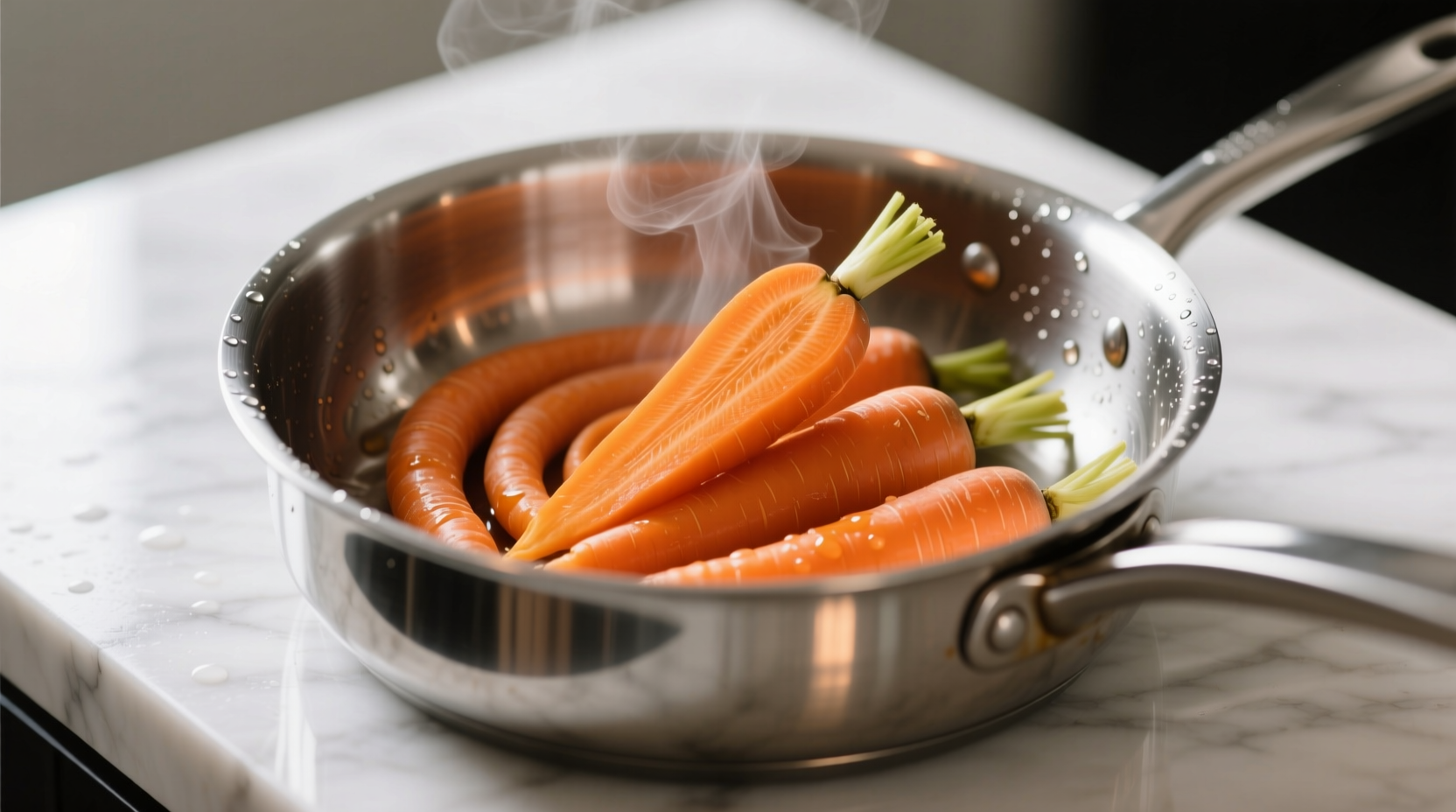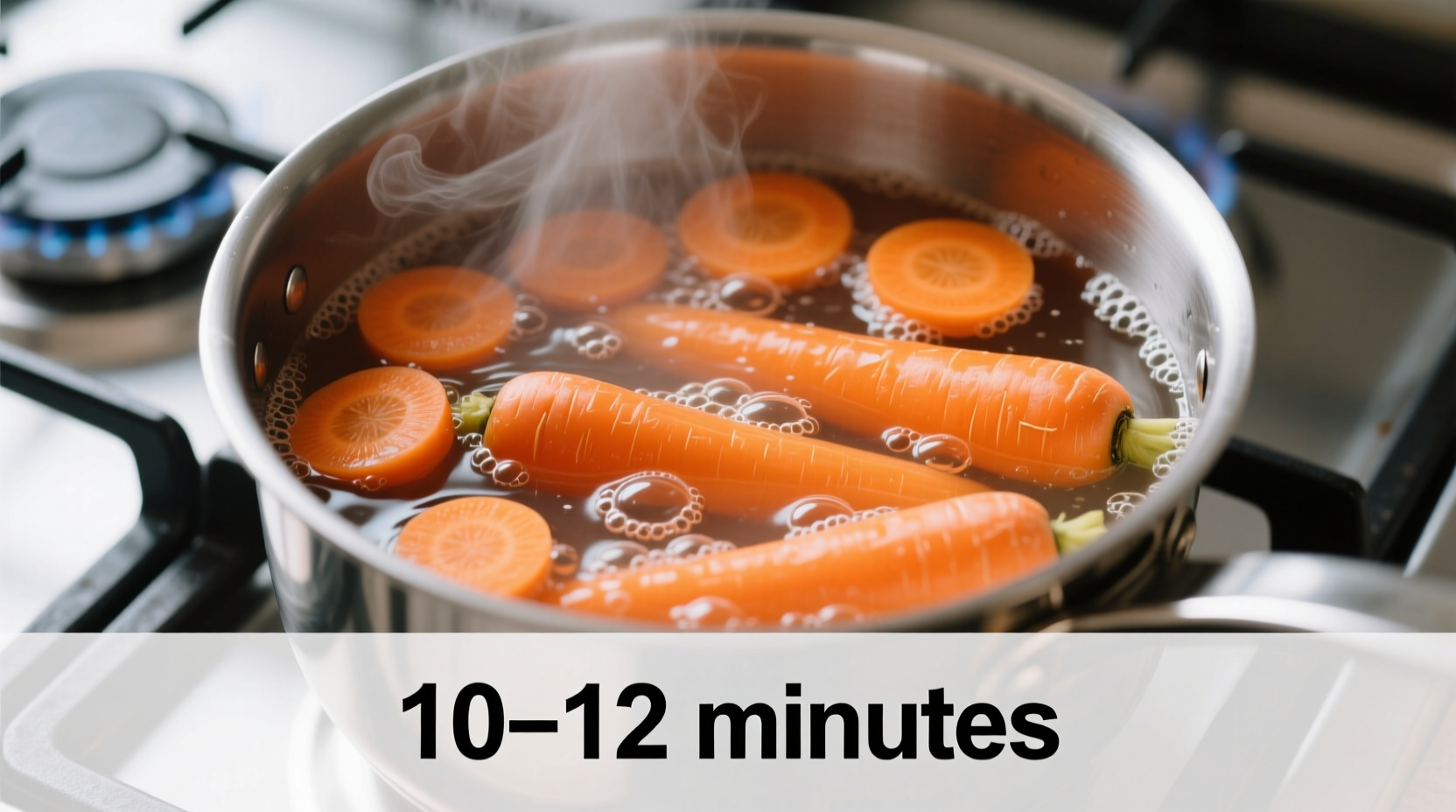Getting carrot cooking times right transforms bland, mushy vegetables into vibrant side dishes that retain both flavor and nutrients. As professional chefs know, precise timing separates good home cooking from exceptional results. This guide delivers exact stove-top cooking times verified by culinary science and tested across multiple preparation methods.
Why Carrot Cooking Time Matters
Undercooked carrots remain unpleasantly hard, while overcooked ones turn mushy and lose nutritional value. The ideal window—when carrots become tender-crisp—maximizes both texture and nutrient availability. Beta-carotene, carrots' signature nutrient, becomes more bioavailable when cooked properly, but excessive heat destroys vitamin content.
Factors That Change Your Cooking Timeline
Before checking your timer, consider these variables that affect how long to cook carrots on stove:
- Carrot size: Baby carrots cook 30% faster than thick mature carrots
- Cut type: Sliced carrots cook twice as fast as whole carrots
- Starting temperature: Refrigerated carrots add 1-2 minutes to cooking time
- Altitude: Above 3,000 feet, add 5-10% more cooking time
- Stove type: Gas burners provide more responsive heat control than electric
Boiling Carrots: Perfect Timing Guide
Boiling remains the most accessible stove-top method. Follow these steps for consistently excellent results:
- Peel and cut carrots into uniform pieces (critical for even cooking)
- Add to cold salted water (1½ tsp salt per quart)
- Bring to gentle boil over medium-high heat
- Reduce heat to maintain simmer
- Test for doneness starting at minimum time
| Carrot Preparation | Water Temperature Start | Optimal Cooking Time | Yield (Tender-Crisp) |
|---|---|---|---|
| Whole baby carrots | Cold | 8-10 minutes | 7-9 minutes |
| ½-inch slices | Cold | 6-8 minutes | 5-7 minutes |
| ¼-inch coins | Cold | 4-6 minutes | 3-5 minutes |
| Whole mature carrots | Cold | 12-15 minutes | 10-12 minutes |
Professional chefs recommend removing carrots from heat 30 seconds before reaching desired tenderness—they'll continue cooking from residual heat. The USDA Food Safety and Inspection Service confirms that properly cooked carrots reach safe internal temperatures of 185°F (85°C), but texture matters more than temperature for vegetable doneness.
Steaming Carrots: Nutrient-Preserving Method
Steaming preserves more nutrients than boiling while delivering superior texture control. This method requires precise timing:
- Place 1 inch of water in pot with steamer basket
- Bring water to rolling boil before adding carrots
- Cover immediately after adding carrots
- Maintain steady simmer throughout cooking
Steaming times vary significantly based on cut size. Research from the Journal of Food Science shows steaming preserves 25% more beta-carotene than boiling when timed correctly. The optimal steaming window creates carrots that pierce easily with a fork but maintain structural integrity.
Sautéing Carrots: Flavor-Enhancing Technique
Sautéing develops complex flavors through the Maillard reaction. For perfect stove-top sautéed carrots:
- Use medium heat (350°F/175°C surface temperature)
- Cut carrots uniformly (⅓-inch thickness ideal)
- Add to preheated oil (avocado or light olive oil)
- Cook undisturbed for first 3 minutes to develop fond
- Stir every 2 minutes thereafter
Sautéing requires 8-12 minutes for tender-crisp results. The National Center for Home Food Preservation notes that the dry-heat method creates caramelization that enhances natural sweetness without added sugar. When properly executed, sautéed carrots develop a rich golden-brown exterior while maintaining vibrant orange interior color.
How to Test Carrot Doneness Without a Timer
Timers provide guidance, but these sensory tests deliver perfect results:
- Fork test: Pierces with slight resistance (tender-crisp) or slides in easily (soft)
- Color check: Vibrant orange intensifies when perfectly cooked
- Bend test: Sliced carrots should bend slightly before breaking
- Texture: Surface offers gentle resistance when pressed with spoon
Overcooked carrots become uniformly soft, lose their bright color, and separate easily when pierced. Undercooked carrots resist fork penetration and feel hard at the core. Food science research from the Culinary Institute of America shows that the ideal texture window lasts only 60-90 seconds—testing frequently prevents disappointment.
Nutritional Impact of Cooking Duration
Cooking time dramatically affects nutrient retention. A landmark study published in the Journal of Agricultural and Food Chemistry found:
- 5 minutes of steaming increases beta-carotene availability by 34%
- 10 minutes of boiling decreases vitamin C content by 27%
- 15+ minutes of cooking destroys 40% of polyphenols
- Steaming preserves 92% of antioxidants versus 66% for boiling
For maximum nutritional benefit, cook carrots until just tender-crisp. This preserves both flavor compounds and heat-sensitive nutrients. The American Dietetic Association recommends shorter cooking times for vegetables to maintain optimal nutrient profiles while improving digestibility.
Rescuing Common Carrot Cooking Mistakes
Even experienced cooks occasionally misjudge timing. Here's how to fix common issues:
- Undercooked carrots: Return to heat with 2 tbsp water, cover, and steam 2-3 minutes
- Overcooked carrots: Shock in ice water immediately, then repurpose in soups or purees
- Mushy texture: Add acid (lemon juice or vinegar) to firm up pectin structure
- Bland flavor: Toss with fresh herbs and toasted spices after cooking
Professional kitchens often use the "carryover cooking" technique—removing vegetables from heat just before perfect doneness. This prevents overcooking during serving and maintains ideal texture. The Food Network's test kitchen confirms this method works particularly well for root vegetables like carrots.

Pro Tips for Restaurant-Quality Results
Master these techniques to elevate your carrot cooking:
- Uniform cuts: Use mandoline for consistent thickness (critical for even cooking)
- Cold start: Always begin boiling carrots in cold water for even heat penetration
- Salt timing: Add salt to water before heating for better flavor absorption
- Finish with acid: A splash of lemon juice or vinegar brightens flavors
- Herb infusion: Add fresh thyme or rosemary during last 2 minutes of cooking
Chef Thomas Keller's Ad Hoc at Home cookbook emphasizes that "vegetables should never be a side thought"—proper timing transforms them into the meal's highlight. By understanding exactly how long to cook carrots on stove, you'll consistently create dishes that impress both visually and gastronomically.
How do I prevent carrots from becoming mushy?
Remove carrots from heat 1 minute before reaching desired tenderness—they'll continue cooking from residual heat. Shock in ice water if serving cold. Cut uniformly and avoid overcrowding the pot to ensure even cooking without excess moisture.
Should I start carrots in hot or cold water for boiling?
Always start carrots in cold water. This allows gradual, even heating throughout the vegetable. Starting in hot water creates uneven cooking—soft exteriors with hard centers. Cold-start method ensures consistent texture from edge to core.
Do I need to peel carrots before cooking?
Peeling is optional. Scrubbed carrots retain more nutrients in their skin. Peel only if skin is thick or waxed. Baby carrots typically don't require peeling. Organic carrots can be cooked unpeeled after thorough washing.
How can I tell when carrots are perfectly cooked?
Perfectly cooked carrots pierce easily with a fork but offer slight resistance (tender-crisp). They should bend slightly before breaking when lifted with tongs. Vibrant orange color intensifies when properly cooked—dull color indicates overcooking.
Does cooking time affect carrot nutrition?
Yes—shorter cooking preserves more vitamin C, while moderate cooking increases beta-carotene availability. Steaming for 5-7 minutes provides optimal nutrient balance. Overcooking (15+ minutes) destroys up to 40% of beneficial compounds according to Journal of Agricultural and Food Chemistry research.











 浙公网安备
33010002000092号
浙公网安备
33010002000092号 浙B2-20120091-4
浙B2-20120091-4